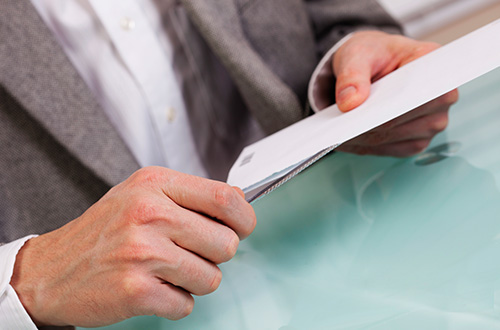Avoid the “Bait Check Swindle” Scam

Keeping our members safe from scams and fraud is a top priority, and we’re committed to helping you learn how to protect yourself. Knowledge is the best defense, which is why it’s so much easier to protect your accounts when we both work together.
Reports of check scams are on the rise, and one of the common scams is known as the “Bait Check Swindle.” In this scam, you receive an unexpected check in the mail that appears to be some sort of rebate or refund. Everyone loves to receive surprise money, so scammers rely on our inclination to deposit the check without a second thought. But that’s where the trouble starts. Once you deposit the check into your account, you are liable – either for the funds of the check, or for hidden terms and conditions.
When you endorse the check with your signature, you unknowingly entered a legally binding contract. The fine print on the check’s endorsement line states that by signing and depositing the check, you agree to some sort of monthly membership or other commitment. This fraud could go undetected for a long time if you don’t methodically monitor your account, making it difficult to undo the damage. Even after you’ve discovered the fraudulent charges, the rules for cancelling the charges are written to make it nearly impossible for you to recover the funds.
Thankfully, this scam can be avoided altogether, as long as you exercise an abundance of caution. Whenever you receive any type of check, make sure you carefully read all of the information on and included with the check. If you don’t know or aren’t sure where or who the check is from or what it’s for, don’t deposit or cash it.
Be on the lookout for these warning signs before taking the bait on a bad check:
- Fine Print Agreement: Carefully look over the check to see if there is a hidden agreement near the signature line. It will likely be very small print, so look closely.
- Typos & Errors: Scam artists use sophisticated technology to create scam checks, but they’re not perfect. Look for typos in the fine print agreement, or incorrect information for the company supposedly sending you the check. Take a few minutes to research the name and phone number of the company listed on the check. Find their official website and see if the contact information matches up. Double check the company name to see if it’s misspelled or the phone number or address are incorrect. Check to see if the logo looks distorted. You can contact the company directly using the phone number on their website to verify if they sent you a check.
- Pressure to Act Now: Don’t deposit or cash the check until you have verified if it is legitimate. Under federal law, financial institutions are required to make deposited funds available quickly. But just because the check has cleared, doesn’t mean you are in the clear. It can take up to 10 days to discover that a check is not legitimate, and then you could be responsible for recovering the funds.
Remember, if something seems suspicious or too good to be true, it probably is. If you’re ever skeptical about a check, bring it in to one of our branches and we will gladly review the check with you to determine whether or not it is legitimate.
If you receive a check that you think is a scam, report it to the Federal Trade Commission. Check out their helpful infographic on how to spot fake check scams.
Robins Financial Credit Union is committed to protecting the safety and security of our members. To find out more about how we protect our members every day, give us a call or stop by any of our branch locations.

